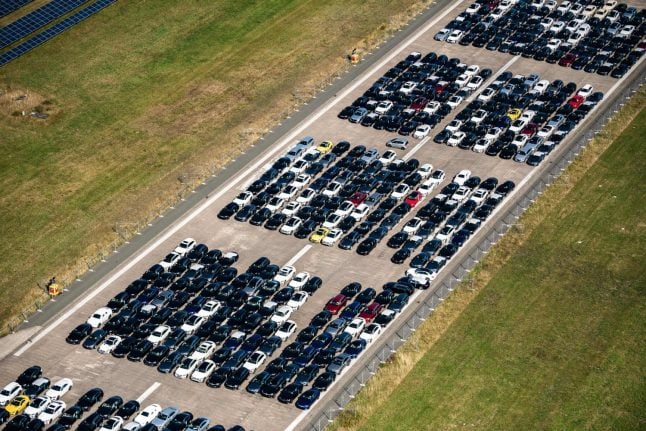The powerful VDA carmakers' club said output had tumbled nine percent year-on-year, blaming “weaker international demand” for the fall.
The lower appetite from abroad comes on top of demanding technological change and tighter emissions restrictions complicating life for carmakers — long a pillar of Europe's largest economy.
READ ALSO: Car sector weakness saps industrial jobs in Germany
“The car industry faces a massive transformation,” in 2020, industry expert Stefan Bratzel of the Center for Automotive Management said.

A Mercedes Benz employee at a factory in Bremen. Photo: DPA
With consumer spending buttressing the domestic market even as economic growth slowed, new registrations of cars on German roads booked an increase of five percent, at 3.6 million.
But auto exports from Germany to the rest of the world fell even more sharply than production, tumbling 13 percent to 3.5 million.
“The fall in car production means Germany continues to lose significance in the global auto industry,” said Ferdinand Dudenhöffer of the Center Automotive Research.
Around the world, car markets have been battered by the effects of the American trade conflict with China.
Last year saw carmakers complain that falling global demand was eating into their business just as massive investments are needed in research and development.
'Hefty fines'
Companies are pumping cash into high-tech projects like automated driving, and switching focus to hybrid or all-electric vehicles from internal combustion engines as they race to meet new emissions limits.
From next year, carmakers must achieve average carbon dioxide (CO2) emissions of 95 grammes per kilometre across newly-sold vehicles in the European Union, on pain of hefty fines.
“The atmosphere is comparable to when cash was switched over from Deutsche Marks to euros on January 1st, 2002,” Der Spiegel magazine wrote citing industry insiders.
“The EU's CO2 legislation is the most important reason” for the big changes set to sweep the car industry, analyst Bratzel said.
Jobs under threat
CO2 limits and other structural factors threaten the auto firms' pride of place in the German economy.
Where in 1998 close to 12 percent of all cars sold worldwide were produced in Europe's powerhouse, the share has shrunk to below six percent in 2019, Dudenhöffer said.
Meanwhile electric motors require less manpower to assemble than their hydrocarbon-burning predecessors, threatening some of the roughly 800,000 car industry jobs in Germany.
Also Monday, figures from the KBA transport authority showed SUVs overtaking compact cars as the most popular class of models on the domestic market.

Greenpeace protesters stand outside the Frankfurt car show in September – in which new SUV models were unveiled – with a sign reading “Transportation turnaround without climate killers'. Photo: DPA
Many SUVs are built not in Germany but in factories operated by the country's multinational carmakers overseas.
READ ALSO: Berlin horror crash prompts growing calls to ban SUVs from German cities
That in turn makes the companies more vulnerable to upsets in international
trade.
In a study published in December, Dudenhöffer forecast that German car production would begin growing again in 2021 after bottoming out this year.
“A fall in sales of three to five percent looks likely” in 2020, consultancy EY judged in a study published Monday.
But “manufacturers have a strong interest in powerfully boosting sales of electric and plug-in hybrid cars from now on… that should be reflected in the statistics at the latest by the middle of the year,” EY added.
By Tom Barfield



 Please whitelist us to continue reading.
Please whitelist us to continue reading.
Member comments